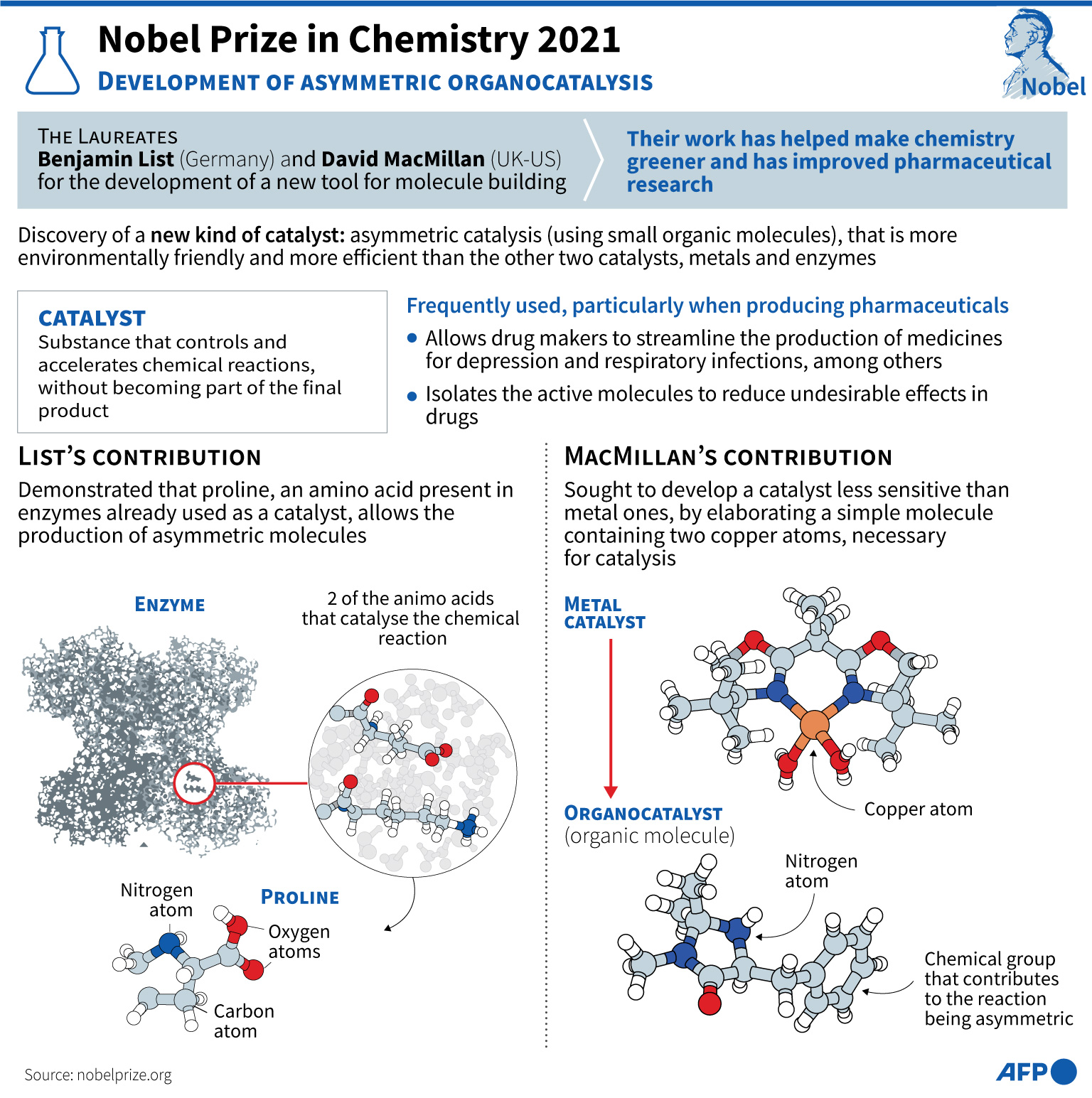Ahmedabad
(Head Office)Address : 506, 3rd EYE THREE (III), Opp. Induben Khakhrawala, Girish Cold Drink Cross Road, CG Road, Navrangpura, Ahmedabad, 380009.
Mobile : 8469231587 / 9586028957
Telephone : 079-40098991
E-mail: dics.upsc@gmail.com

Nobel Prize for Chemistry
News: The Nobel Prize for chemistry has been awarded to German scientist Benjamin List of the Max Planck Institute and Scotland-born scientist David WC MacMillan of Princeton University for their work on developing an organo-catalyst.
Background:
• When two or more compounds react to form new compounds, the process is often aided by other chemicals that do not change themselves but help speed up the reaction.These catalysts have been known at least since the middle of the 19th century, and are used in virtually every chemical process these days.
• Till around 2000, only two kinds of chemicals were known to act as effective catalysts: metals, mainly heavier metals; and enzymes, naturally occurring heavy molecules that facilitate all life-supporting biochemical processes.Both these sets of catalysts had limitations.
• Heavier metals are expensive, difficult to mine, and toxic to humans and the environment.
• Despite the best processes, traces remained in the end product; this posed problems in situations where compounds of very high purity were required, like in the manufacture of medicines.
• Also, metals required an environment free of water and oxygen, which was difficult to ensure on an industrial scale.Enzymes on the other hand, work best when water is used as a medium for the chemical reaction.
• But that is not an environment suitable for all kinds of chemical reactions.
Latest invention:
• List and MacMillan, the both, started experimenting with simple organic compounds.
• Organic compounds are mostly naturally occurring substances, built around a framework of carbon atoms and usually containing hydrogen, oxygen, nitrogen, sulfur, or phosphorus.
• Life-supporting chemicals like proteins, which are long chains of amino acids (carbon compounds containing nitrogen and oxygen) are organic.
• Enzymes are also proteins, and therefore, organic compounds.
• List and MacMillan started working with individual amino acids in enzymes — and struck gold.
Asymmetric catalysis:
• Substances can have exactly the same chemical composition and molecular formula; yet differ widely in their properties. They are known as isomers.
• One type of isomers is those that differ in the way individual atoms are oriented in three-dimensional space.
• Two molecules could be exactly the same, except that they are mirror images of each other, like our hands.
• For simplicity, scientists often refer to these molecules as left-handed or right-handed.
• This simple difference can sometimes have enormous consequences because it allows the molecules to bind in different locations when they interact with other molecules.
• The end product in a chemical reaction is usually a mixture of left-handed and right-handed molecules.
• List and MacMillan discovered that by using a natural compound like an amino acid as a catalyst, they were obtaining only one specific mirror image of the end-product.This was later named asymmetric catalysis.
Significance:
• The new catalysts, derived from naturally occurring chemicals, were greener and cheaper and ensured that the end product of the chemical reaction was of a specific variety.The end product need not go through a purification process to yield the desired type of compound.The discovery being awarded the Nobel Prize in Chemistry 2021 has taken molecular construction to an entirely new level.
• Its uses include research into new pharmaceuticals and it has also helped make chemistry greener.

Address : 506, 3rd EYE THREE (III), Opp. Induben Khakhrawala, Girish Cold Drink Cross Road, CG Road, Navrangpura, Ahmedabad, 380009.
Mobile : 8469231587 / 9586028957
Telephone : 079-40098991
E-mail: dics.upsc@gmail.com
Address: A-306, The Landmark, Urjanagar-1, Opp. Spicy Street, Kudasan – Por Road, Kudasan, Gandhinagar – 382421
Mobile : 9723832444 / 9723932444
E-mail: dics.gnagar@gmail.com
Address: 2nd Floor, 9 Shivali Society, L&T Circle, opp. Ratri Bazar, Karelibaugh, Vadodara, 390018
Mobile : 9725692037 / 9725692054
E-mail: dics.vadodara@gmail.com
Address: 403, Raj Victoria, Opp. Pal Walkway, Near Galaxy Circle, Pal, Surat-394510
Mobile : 8401031583 / 8401031587
E-mail: dics.surat@gmail.com
Address: 303,305 K 158 Complex Above Magson, Sindhubhavan Road Ahmedabad-380059
Mobile : 9974751177 / 8469231587
E-mail: dicssbr@gmail.com
Address: 57/17, 2nd Floor, Old Rajinder Nagar Market, Bada Bazaar Marg, Delhi-60
Mobile : 9104830862 / 9104830865
E-mail: dics.newdelhi@gmail.com